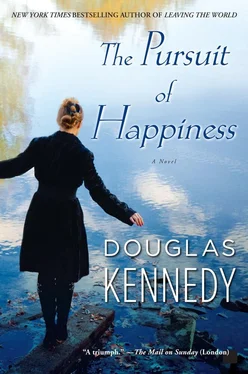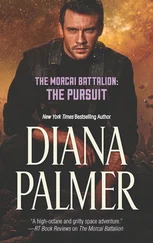'Yes, I was'.
'No, really - you were just being... informative'.
'Informative? Direct is more like it'.
'I'd say... instructive'.
'Candid. Explicit. Frank. It doesn't really matter, does it?'
'Well, semantically speaking...'
Before this exchange, I'd had a few nervous little qualms about rejecting Horace's marriage proposal. After this exchange, all lingering doubts had been killed off. To my parents - and to many of my friends at Bryn Mawr - I had bucked convention by rejecting his offer. After all, he was such a safe bet. But I was certain I could meet someone with a little more sparkle and passion. And, at the age of twenty-two, I didn't want to buy myself a one-way ticket to wifehood without stopping to think about other options along the way.
And so, when I reached New York, the idea of finding a boyfriend was low on my list of priorities. Especially as I had so much to grapple with during that first year.
The family house was sold by Christmas - but almost all the proceeds went on Mother's medical bills and residential care. Eric and I greeted 1944 in a grubby hotel in Hartford, having rushed back on New Year's Eve afternoon when the nursing home called, saying that Mother had contracted a chest infection which had suddenly mutated into pneumonia. It was touch and go whether or not she'd pull through. By the time we'd reached Hartford, the doctors had stabilized her. We spent an hour at her bedside. She was deeply comatose, and stared up at her two children blankly. We both kissed her goodbye. As we'd missed the last train back to Manhattan, we checked into this slum of a hotel near the railway station. We spent the rest of the evening in the hotel bar, drinking bad Manhattans. At midnight, we sang 'Auld Lang Syne' with the bartender and a few forlorn traveling salesmen.
It was a grim start to the year. It got grimmer - as the next morning, just when we were checking out, a call came from the nursing home. I took it. It was from a staff doctor, on call that morning.
'Miss Smythe, I regret to inform you that your mother passed away half-an-hour ago'.
Oddly enough, I didn't feel an overwhelming rush of grief (that came a few days later). More a sense of numbness, as the thought sank in: my family now is Eric.
He was also caught off guard by the news. We took a cab to the nursing home. En route, he started to sob. I put my arms around him.
'She always hated New Year's Day', he finally said.
The funeral was the next morning. Two neighbors and our father's secretary showed up at the church. After the cemetery, we took a taxi back to the railway station. On the train back to New York, Eric said, 'I'm certain that's the last time I'll ever set foot in Hartford'.
There wasn't much of an estate - just two insurance policies. We ended up with around five thousand dollars each - quite a bit of money in those days. Eric instantly quit his Theater Guild job, and took off for a year to Mexico and South America. His portable Remington came with him - as he was planning to spend twelve months writing a major new play and maybe gathering material for a journal de voyage about travels in Latin America. He said he wanted me to come along - but I certainly wasn't going to quit my job at Life after just seven months.
'But if you come with me, you'll be able to concentrate on writing fiction for a year', he said.
'I'm learning a great deal at Life'.
'Learning what? How to write five-hundred-word articles about the Broadway premiere of Bloomer Girl or why chokers are this year's fashion accessory'.
'I was rather proud of those two pieces', I said, 'even if they didn't give me a byline'.
'My point exactly. As that editor guy told you, you'll never be assigned the big stories - because they all go to the senior male writers on the staff. You want to write fiction. So, what's stopping you? You have the money and the freedom. We could rent a hacienda in Mexico with the money we have between us... and both write all day, unencumbered'.
'It's a lovely dream', I said, 'but I'm not going to leave New York having just arrived here. I'm not ready to be a full-time writer yet. I need to find my way first. And the job at Life will also give me some necessary seasoning'.
'God, you're far too sensible. And I suppose you're planning to do something ultra-practical with your five thousand dollars'.
'Government bonds'.
'S, really. You've turned into Little Miss Prudent'.
'Guilty as charged'.
So Eric disappeared south of the border, and I stayed on in Manhattan, working at Life by day and trying to write short stories by night. But the pressures of the day job - and the vicarious pleasures of Manhattan - kept me away from the Remington typewriter in my studio apartment. Every time I sat down at home to work, I found myself thinking: I really don't have much to say, do I? Or that same doubting voice in the back of my head would whisper: There's a great double-feature at the RKO 58th Street: Five Graves to Cairo and Air Force. Or a girlfriend would ring up, suggesting Saturday lunch at Schrafft's. Or I'd have to finish a story for Life. Or the bathroom needed cleaning. Or... I'd find one of the million excuses that would-be writers always find to dodge the tyranny of the desk.
Eventually I decided to stop fooling myself. So I moved my Remington off the dining table and into the closet. Then I wrote Eric a long letter, explaining why I was putting my writing ambitions on hold:
I've never traveled. I've never seen anywhere south of Washington, DC... let alone the world. I've never been in mortal danger. I've never known anyone who's gone to prison, or has been indicted by a federal grand jury. I've never worked in the slums, or in a soup kitchen. I've never hiked the Appalachian Trail, or climbed Mt Kathadin, or paddled across Saranac Lake in a canoe. I could have volunteered for the Red Cross and gone to war. I could have joined the WPA and taught school in the Dust Bowl. I could have done around a thousand more interesting things than I'm doing now - and, in the process, found something to write about.
Hell, E - I've never even fallen in love. So no wonder nothing happens when I sit down at the typewriter.
I sent the letter c/o Poste Restante, Zihuantanejo, DF, Mexico. Eric was temporarily living in this corner of the Mexican tropics, having rented a house on the beach. Seven weeks later, I received a reply - scribbled in dense tiny print on a postcard, datemarked Tegucigalpa, Honduras.
S,
What you're really saying in your letter is that, as yet, you don't think you have a story to tell. Believe me, everybody has a story to tell - because all life is narrative. But knowing that is probably of little comfort to somebody suffering from writer's block (a condition of which I have ongoing experience). The rule of the game is a simple one: if you want to write, you will write. And know this: if you want to fall in love, you will find someone to fall in love with. But take it from your older, battle-scarred brother: you should never set out to fall in love. Because those sort of romances always seem to end up as the stuff of cheap melodrama. Real love, on the other hand, sneaks up on you unawares... then gives you a kick in the head.
I should never have left Mexico. The best thing about Tegucigalpa is the bus out of Tegucigalpa. I'm heading south. Will write again when I've unpacked somewhere.
Love,
E
Over the course of the next ten months - as I worked hard at Life and spent every free moment roaming New York - I tried not to rue too much my stalled literary career. And I certainly met nobody with whom I felt like falling in love. But I did receive plenty of postcards from Eric, datemarked Belize, San Jose, Panama City, Cartagena, and eventually Rio. He returned to New York in June of '45, dead broke. I had to lend him two hundred dollars to see him through his first month home, during which time he moved back into his apartment and scrambled for work.
Читать дальше












